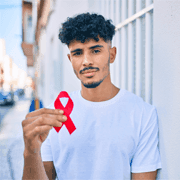BETTER SEX: LGBTQIA+ Safer Sex Guide – Pleasure, Preventive Care, Tips
In This Article
BETTER SEX: LGBTQIA+ Safer Sex Guide – Pleasure, Preventive Care, Tips
Sreemoyee
Updated on November 16, 2023
Medically verified by Dr. Arya
Fact checked by Dr. Sharon

Wellness
6 min read
Sex is often regarded as a taboo in today’s world. And not many feel comfortable to talk about sexual health. It becomes worse when it comes to discussing safe sex among the LGBTQIA+ community.
Wondering where you would find more information on safer sex guides, pleasure, preventive care and tips for those who are LGBTQIA+ individuals? You’re in the right place.
Mykare Health stands out as a helping hand for all, irrespective of their gender and sexual orientation. With a clear focus on inclusivity and enhanced health, we’re here with a handy manual.
Let's talk about something we all cherish – better, safer, and more pleasurable sex, with a special focus on LGBTQIA+ individuals.
What's LGBTQIA+ and What Sex Means for Them
LGBTQIA+ stands for Lesbian, Gay, Bisexual, Transgender, Queer/Questioning, Intersex, and Asexual, plus all the other beautiful identities under this rainbow.
Their sex lives, like anyone else's, are about love, intimacy, and connection. It's about being true to themselves.
But, like anybody else, their sex life comes with its own bit of challenges. It is important to be aware of these challenges to be able to overcome them.
Challenges in Their Sex Life
Okay, let's get real. LGBTQIA+ folks often face unique challenges. Discrimination, lack of understanding, and even healthcare disparities can be hurdles. Plus, not everyone gets ‘the talk’ about safe sex, which can lead to risky behaviours.
Here’s the challenges they face at a glance.
| Challenge | Description |
|---|---|
| Stigma and Discrimination | People from LGBTQIA+ community may often have to face stigma and discrimination. This leads to inadequate access to healthcare & support services among them. |
| Unawareness about sex education | Knowledge or information about sex education are often not enough and biassed among LGBTQIA+ community. As a result, most often they are unaware of safe sex practices. |
| Healthcare Disparities | Health disparities toward the LGBTQIA+ community are pretty much common. Lack of LGBTQIA+ friendly healthcare providers acts as a barrier for them to access appropriate preventive care and sexual health services. |
| Mental Health Challenges | Societal bias and discrimination act as stress triggers. They can also generate mental health issues that affect one's sex life. |
| Relationship Challenges | Relationship challenges due to external pressures are common among LGBTQIA+ couples. This gives rise to difficulties in maintaining healthy sexual relationships. |
| Unprotected Sex | They often engage in unprotected sex due to lack of awareness, increasing the risk of STIs (Sexually Transmitted Infections). |
| Substance Use | Recreational drug use is observed in some LGBTQIA+ communities. This increases the risk of risky sexual behaviours and health consequences. |
| Fear of Disclosure | Some LGBTQIA+ individuals may fear disclosing their sexual orientation or gender identity. This can affect communication with partners. |
It's important to note that these challenges can vary greatly depending on an individual's specific circumstances and the region they live in. Education, awareness, and support can help address and mitigate these challenges within the LGBTQIA+ community. That’s exactly why you need to read this.
 7 min read
7 min readPhysical Fitness and Sexual Health: How Exercise Boosts Your Sexual Life
 7 min read
7 min readSexually Transmitted Diseases: Types, Symptoms, Treatment
 14 min read
14 min readHow to Avoid Pregnancy After Sex
Book Your Consultation Now
Unsafe Sexual Practices – What to Watch Out For
Whether you're gay, lesbian, bisexual, transgender, queer, or any other beautiful identity under the rainbow, sexual health is crucial. So, let's dive into what you should watch out for.
Unprotected Sex : No matter your sexual orientation, unprotected sex is a no-go. Always use barriers like condoms, dental dams, or gloves, depending on your preference and the activity.
Sharing Needles : If you're into recreational drugs, sharing needles is a big red flag. Sharing needles can spread HIV, Hepatitis, and other infections. Use your own, sterile equipment.
Skipping Regular Check-Ups : Regular sexual health check-ups are like oil changes for your car – necessary. Ignoring them can lead to unnoticed infections.
Ignoring Consent: Consent is like the golden rule of sex – always ask, always respect. No means no, and silence isn't consent. Everyone deserves a safe and consensual experience.
Mental Health Matters: The LGBTQIA+ community faces unique stressors, and mental health is part of sexual health. Don't hesitate to seek support if you're struggling with anxiety, depression, or other mental health challenges.
Relying on Pulling Out: The ‘pulling out’ method is about as reliable as a leaky boat. If you're not ready for parenthood, use contraception.
Not Cleaning Your Toys: If you use toys, cleanliness is crucial. Bacteria and pleasure don't mix well. Keep your toys squeaky clean for your own safety.
Believing in Myths: Don't buy into sexual myths like ‘STIs can't be transmitted through oral sex.’ They absolutely can. Stay informed and make decisions based on facts, not fiction.
Skipping Lube: Lube isn't just for some people. It's for anyone who wants to make sex more comfortable and enjoyable. Don't skip it. It's your friend.
Ignoring Your Partner's Boundaries: Your partner's boundaries are as important as yours. Respect them, communicate openly, and create a space where everyone feels safe and heard.
Safer Sex Guide – Pleasure, Preventive Care, Tips
Enough about the challenges, let's dive into the good stuff – safer and more pleasurable sex!
Use Protection: Condoms, dental dams, and gloves are your buddies. They're not mood killers; they're safety enhancers.
Lube is Your Friend: Not all lubes are created equal. Find one that suits you; it can make everything smoother (pun intended).
Get Tested: Regular STI check-ups are like Netflix subscriptions – you gotta renew 'em. It's responsible and hot!
Communication is Key: Talk to your partner(s) about your desires, boundaries, and any concerns. It's the sexiest conversation you can have.
Prep and PEP: If you're at a higher risk for HIV, PrEP (Pre-Exposure Prophylaxis) can be a game-changer. PEP (Post-Exposure Prophylaxis) is an option if you've had a potential exposure.
Clean Your Toys: Keep those toys squeaky clean. Bacteria and fun times don't mix.
Mental Health Matters: Good mental health is part of good sexual health. Seek support when needed.
Stay Informed: Knowledge is your superpower. Learn about sexual health and stay updated.
Consent is Non-Negotiable: Always, always get enthusiastic consent. No means no, and yes means yes!
Love Yourself: Embrace self-love and self-acceptance. You're awesome, just as you are.
Remember, your sexual health is a priority, and you deserve a fulfilling, safe, and pleasurable sex life. Mykare Health is always there to guide you on this.
Don't be afraid to seek out LGBTQIA+ friendly healthcare providers who understand your unique needs.
So there you have it – a LGBTQIA+ Safer Sex Guide that's got your back. Stay safe, stay happy, and stay true to yourself!
Discrimination, lack of comprehensive sex education, healthcare disparities, mental health struggles, relationship challenges, unprotected sex, substance use, and fear of disclosure are common sex life struggles among LGBTQIA+ individuals.
These challenges can vary depending on individual circumstances and region.
Access to the right information, awareness, and support can help address them.
Safer sex practices are crucial for everyone, regardless of sexual orientation. Use protection (condoms, dental dams, gloves), avoid sharing needles, prioritise regular check-ups, always seek and respect consent, and take care of your mental health.
Avoid myths and misconceptions about sexual health, and use lube to enhance comfort and pleasure.
Communication with partners is key, and understanding boundaries is essential.
Consider options like PrEP and PEP if at a higher risk for HIV.
Love and accept yourself, and remember that your sexual health is a priority.
Seek LGBTQIA+ friendly healthcare providers for support and guidance.



